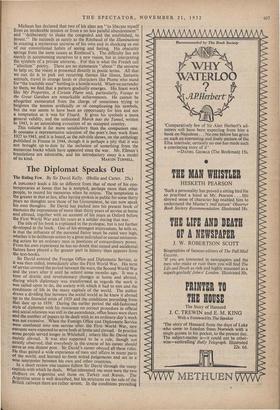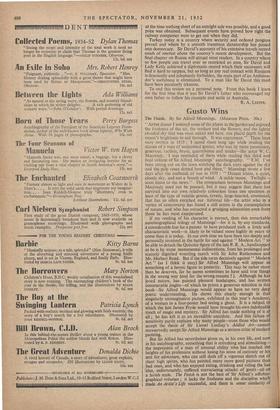The Diplomat Speaki Out
The Ruling Few. By Sir David Kelly. (Hollis and Carter. 25s.) A DIPLOMAT leads a life so different from that of most of his con- temporaries at home that he is tempted, perhaps more than other People, to record his memories when he retires. The temptation is the greater in that at last, after having spoken in public for some thirty years no thoughts save those of his Government, he can now speak his own thoughts. Sir David has packed into his present book of memoirs the impressions of more than thirty years of service at home and abroad, together with an account of his years at Oxford before the First World War and his years as a soldier during that war.
The title of his book is explained in the prologue, but is not further developed in the book. One of his strongest impressions, he tells us, is that the influence of the personal factor must be rated very high, whether it be deliberate action by a great individual or casual unreason- ing action by an ordinary man in positions of extraordinary power. From his own experience he has no doubt that casual and accidental factors have played a far greater part in history than appears from the text-books.
Sir David entered the Foreign Office and Diplomatic Service, as it was then called, immediately after the First World War. His term of service covered the period between the wars, the Second World War and the years after it until he retired some months ago. It was a time of drastic and revolutionary changes at home and abroad, dining which diplomacy was transformed as regards the work it was called upon to do, the society with which it had to mix and the conditions of life in the many capitals of the world. The author draws a dividing line between the social world as he knew it abroad up to the financial crisis of 1929 and the conditions prevailing from that date up to 1939. During the earlier period the old-fashioned style of diplomat with his insistence on correct procedure in official and social relations was still in the ascendancy, office hours were short and the number of papers to be dealt with in an ordinary day's work was not excessive. When the Foreign Office and Diplomatic Service were combined into one service after the First World War, new entrants were expected to serve, both at home and abroad. In practice some people served longer in Whitehall ; others like Sir David were mainly abroad. It was also supposed to be a rule, though not strictly observed, that everybody in the course of his career should serve at one distant post. Sir David's career obeyed all these rules. He thus gained a wide experience of men and affairs in many parts of the world, and learned to form sound judgements and act as a wise interpreter between his own and other countries. In a short review one cannot follow Sir David through the 'many capitals with which he deals. What interested me most were the two chapters on Argentina and those on Turkey and Russia. The Argentine scene is well described, but his strictures on the sale of the British railways there are rather severe, In the conditions prevailing at the time nothing short of an outright sale was possible, and a good price was obtained. Subsequent events have proved how right the railway companies were to get out when they did.
Turkey today is a country where security and ordered progress prevail and where by a smooth transition dictatorship has passed into democracy. Sir David's accounts of his extensive travels record much of interest about the country's recent development. But the final chapter on Russia will attract most readers. In a country where so few people can travel over so restricted an area, Sir David and Lady Kelly achieved a diplomatic record which their successors will find it hard to surpass, but so long as any real contact with Russians is drastically and inhumanly forbidden, the main part of an Ambassa- dor's usefulness is eliminated. To a man like Sir David this must have been peculiarly irksome.
To end this review on a personal note. From this book I learn for the first time that it was Sir David's father who encouraged my own father to follow his example and settle in Australia.
R. A.. LEEPER.











































































 Previous page
Previous page